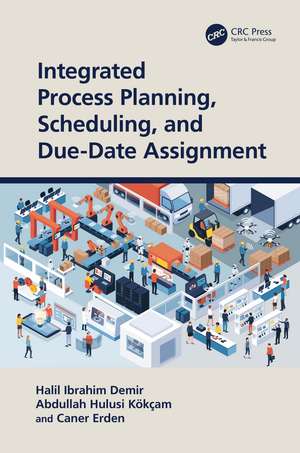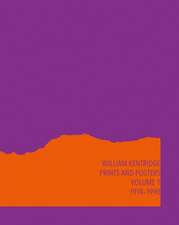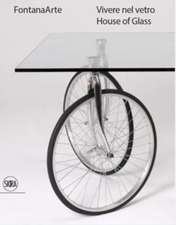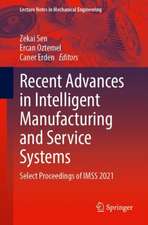Integrated Process Planning, Scheduling, and Due-Date Assignment
Autor Halil Ibrahim Demir, Abdullah Hulusi Kökçam, Caner Erdenen Limba Engleză Hardback – 10 aug 2023
Integrated Process Planning, Scheduling, and Due-Date Assignment combines the most important manufacturing functions to use manufacturing resources better, reduce production costs, and eliminate bottlenecks with increased production efficiency. The book covers how the integration will help eliminate scheduling conflicts and how to adapt to irregular shop floor disturbances. It also explains how other elements, such as tardiness and earliness, are penalized and how prioritizing helps improve weight performance function.
This book will draw the interest of professionals, students, and academicians in process planning, scheduling, and due-date assignment. It could also be supplemental material for manufacturing courses in industrial engineering and manufacturing engineering departments.
Preț: 581.34 lei
Preț vechi: 683.94 lei
-15% Nou
Puncte Express: 872
Preț estimativ în valută:
111.24€ • 116.38$ • 92.41£
111.24€ • 116.38$ • 92.41£
Carte tipărită la comandă
Livrare economică 02-16 aprilie
Preluare comenzi: 021 569.72.76
Specificații
ISBN-13: 9781032104263
ISBN-10: 1032104260
Pagini: 152
Ilustrații: 19 Tables, black and white; 24 Line drawings, black and white; 10 Halftones, black and white; 34 Illustrations, black and white
Dimensiuni: 156 x 234 x 16 mm
Greutate: 0.34 kg
Ediția:1
Editura: CRC Press
Colecția CRC Press
ISBN-10: 1032104260
Pagini: 152
Ilustrații: 19 Tables, black and white; 24 Line drawings, black and white; 10 Halftones, black and white; 34 Illustrations, black and white
Dimensiuni: 156 x 234 x 16 mm
Greutate: 0.34 kg
Ediția:1
Editura: CRC Press
Colecția CRC Press
Public țintă
Postgraduate, Professional, Professional Practice & Development, and Undergraduate AdvancedCuprins
1. Introduction to Integrated Process Planning, Scheduling, and Due-Date Assignment. 2. Process Planning. 3. Scheduling in Manufacturing. 4. Due-Date Assignment. 5. Integrated Process Planning and Scheduling. 6. Dynamic Integrated Process Planning and Scheduling. 7. Scheduling with Due-Date Assignment. 8. Scheduling with Due-Window Assignment. 9. Integrated Process Planning, Scheduling, and Due-Date Assignment. 10. Dynamic Integrated Process Planning, Scheduling, and Due-Date Assignment. 11. Solution Techniques in Integrated Manufacturing Functions. 12. Integrated Process Planning, Scheduling, Due-Date Assignment, and Delivery.
Notă biografică
H.I. Demir completed his undergraduate education at Bilkent University, Industrial Engineering Department, with a full scholarship in Ankara, Türkiye. He completed his master's degree in Industrial Engineering at Lehigh University, Bethlehem, USA, with a full scholarship from the Ministry of National Education of Türkiye. He started his Ph.D. in Industrial Engineering at Northeastern University, Boston, USA, and completed his courses there. After returning to Türkiye, he finished his Ph.D. thesis on "Integrated Process Planning, Scheduling, and Due-date Assignment" at Sakarya University. He is still working as an Assistant Professor at Sakarya University. His research interests include optimization, simulation, scheduling, decision theory, multicriteria decision-making, and meta-heuristic algorithms.
A.H. Kökçam completed his master's degree at Sakarya University, Department of Industrial Engineering, in 2010 with a study on fuzzy project scheduling using meta-heuristic methods. He received his Ph.D. from Sakarya University, Department of Industrial Engineering, in 2017. In his doctoral dissertation, he worked on an alternative model to evaluate school success in the entrance examination for higher education. He works as an assistant professor at the Sakarya University Industrial Engineering Department. His research interests include meta-heuristic methods, artificial intelligence, fuzzy logic, optimization, and scheduling.
C. Erden is currently an assistant professor at the Sakarya University of Applied Sciences and a senior researcher at the AI Research and Application Center, Sakarya University of Applied Sciences, Sakarya, Türkiye. He worked as a research assistant in industrial engineering at Sakarya University and a researcher at Sakarya University AI Systems Application and Research between 2012-2020. He received his Ph.D. from Sakarya University in the field of industrial engineering. His research interests include scheduling, discrete event simulation, meta-heuristic algorithms, modeling and optimization, machine learning, and deep learning.
A.H. Kökçam completed his master's degree at Sakarya University, Department of Industrial Engineering, in 2010 with a study on fuzzy project scheduling using meta-heuristic methods. He received his Ph.D. from Sakarya University, Department of Industrial Engineering, in 2017. In his doctoral dissertation, he worked on an alternative model to evaluate school success in the entrance examination for higher education. He works as an assistant professor at the Sakarya University Industrial Engineering Department. His research interests include meta-heuristic methods, artificial intelligence, fuzzy logic, optimization, and scheduling.
C. Erden is currently an assistant professor at the Sakarya University of Applied Sciences and a senior researcher at the AI Research and Application Center, Sakarya University of Applied Sciences, Sakarya, Türkiye. He worked as a research assistant in industrial engineering at Sakarya University and a researcher at Sakarya University AI Systems Application and Research between 2012-2020. He received his Ph.D. from Sakarya University in the field of industrial engineering. His research interests include scheduling, discrete event simulation, meta-heuristic algorithms, modeling and optimization, machine learning, and deep learning.
Descriere
Traditionally, the three most important manufacturing functions are process planning, scheduling, and due-date assignment, which are handled sequentially and separately. This book integrates these manufacturing processes and functions to increase global performance along with manufacturing and production cost savings.


















